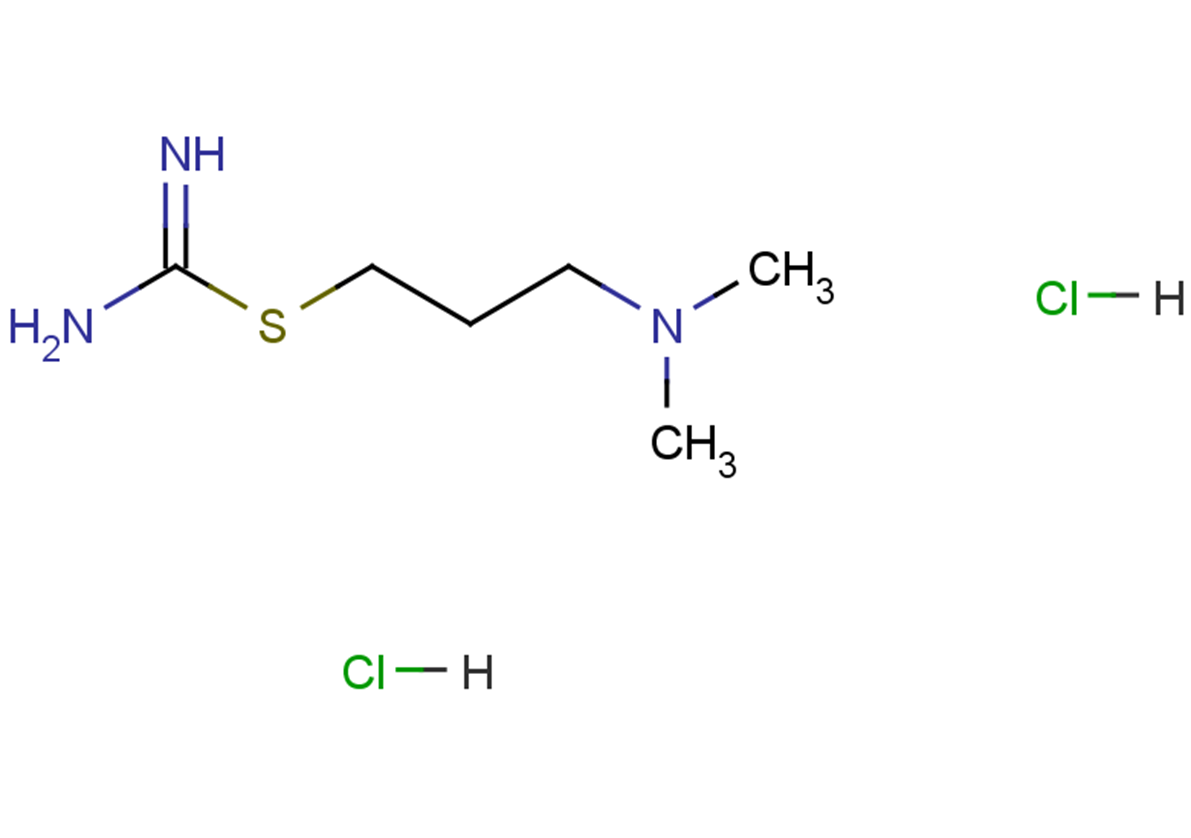
Dimaprit dihydrochloride
CAS No. 23256-33-9
Dimaprit dihydrochloride ( —— )
Catalog No. M24062 CAS No. 23256-33-9
Dimaprit dihydrochloride is a selective histamine H2 receptor agonist. Dimaprit dihydrochloride also inhibits nNOS with an IC50 of 49 μM. It can stimulate gastric acid secretion.
Purity : >98% (HPLC)
 COA
COA
 Datasheet
Datasheet
 HNMR
HNMR
 HPLC
HPLC
 MSDS
MSDS
 Handing Instructions
Handing Instructions
| Size | Price / USD | Stock | Quantity |
| 25MG | 43 | In Stock |


|
| 50MG | 74 | In Stock |


|
| 100MG | 119 | In Stock |


|
| 200MG | Get Quote | In Stock |


|
| 500MG | Get Quote | In Stock |


|
| 1G | Get Quote | In Stock |


|
Biological Information
-
Product NameDimaprit dihydrochloride
-
NoteResearch use only, not for human use.
-
Brief DescriptionDimaprit dihydrochloride is a selective histamine H2 receptor agonist. Dimaprit dihydrochloride also inhibits nNOS with an IC50 of 49 μM. It can stimulate gastric acid secretion.
-
DescriptionDimaprit dihydrochloride is a selective histamine H2 receptor agonist. Dimaprit dihydrochloride also inhibits nNOS with an IC50 of 49 μM. It can stimulate gastric acid secretion.
-
Synonyms——
-
PathwayGPCR/G Protein
-
TargetHistamine Receptor
-
RecptorH2 receptor;nNOS
-
Research Area——
-
Indication——
Chemical Information
-
CAS Number23256-33-9
-
Formula Weight234.2
-
Molecular FormulaC6H15N3S·2HCl
-
Purity>98% (HPLC)
-
SolubilityH2O:<23.42mg/ml
-
SMILESNC(SCCCN(C)C)=N.[H]Cl.[H]Cl
-
Chemical Name——
Shipping & Storage Information
-
Storage(-20℃)
-
ShippingWith Ice Pack
-
Stability≥ 2 years
Reference
1.Parsons ME, et, al. Dimaprit -(S-[3-(N,N-dimethylamino)prophyl]isothiourea) - a highly specific histamine H2 -receptor agonist. Part 1. Pharmacology. Agents Actions. 1977 Mar; 7(1): 31-7.
molnova catalog


related products
-
SUVN-G3031
SUVN-G3031 (SUVN-G 3031) is a potent, selective, orally active histamine H3 receptor (H3R) inverse agonist with Ki of 8.73 nM (hH3R).
-
Diphenhydramine hydr...
Diphenhydramine HCl (Benadryl), a histamine H1 antagonist used as an antiemetic, antitussive.
-
Toreforant
Toreforant (JNJ-38518168) is a potent, selective histamine H4 receptor (H4R) antagonist with Ki of 8.4 nM.



 Cart
Cart
 sales@molnova.com
sales@molnova.com


